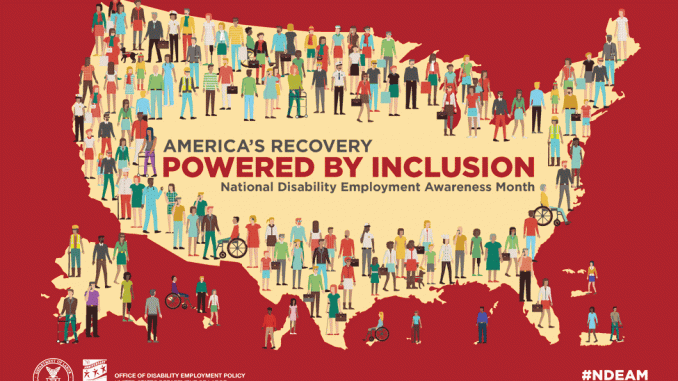
October is National Disability Employment Awareness Month (NDEAM). In this article, you’ll learn four important concepts that impact NDEAM in 2021:
1. How the federal government is framing NDEAM 2021
2. Work-from-home roadblocks for employees with disabilities (see disability employment and WFH statistics here)
3. How working can potentially jeopardize state-based benefits, and
4. How to find free help for disability-related employment concerns.
Every year, NDEAM celebrates the diverse contributions that people with disabilities make to the U.S. workplace and economy. The theme of NDEAM 2021 is “America’s Recovery: Powered by Inclusion.”
Based on a White House NDEAM proclamation, the 2021 theme’s reach is twofold:
First, it acknowledges the ongoing need for full inclusion in the workforce for employees with disabilities, including “dismantling barriers to access and inclusion,” fueled in part by the Americans with Disabilities Act (ADA). The ADA is intended to help fuel “increased economic participation” and “a powerful shield against discrimination in the workplace” for the more than 60 million employees with disabilities across the U.S.
Second, the theme identifies that COVID-19 has disrupted and compounded workplace gaps for people with disabilities, particularly women and people of color. This disruption stems from multiple causes, among them the heightened health risks to workers with disabilities and the disproportionate impact of pandemic-related disruptions and work restrictions on industries that tend to record higher numbers of employees with disabilities (more on that in our next section).
While the White House proclamation does not outline extensive steps that the federal government plans to take to help ameliorate these concerns, it does mention one specific step: working to eliminate the outdated provisions in the Fair Labor Standards Act that currently allow employers to pay certain employees with disabilities less than the minimum wage.
“This is the disability issue that no one is talking about, and it’s enormous.”
Nearly two years into the COVID-19 pandemic, the Rutgers Program for Disability Research reported that workers with disabilities are disproportionately likely to work in fields that do not permit part-time or full-time remote work options. These workplaces may include restaurants, factories, and retail stores.
The disability advocacy community has continued to spotlight the ironic fact that as businesses have rushed to provide remote work pathways to their workforces due to pandemic disruptions, employees with disabilities have had to fight for decades for their right to these kinds of reasonable accommodations as professionals.
To read this article in its entirety at HelpHopeLive.org, click here.
